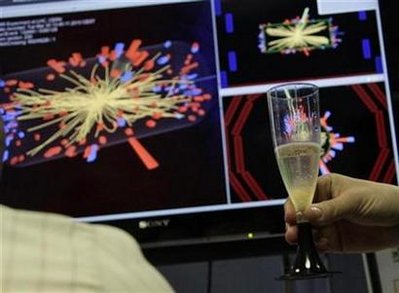Society
'Big Bang' scientists map cautious plan for 2011
Updated: 2011-02-10 09:08
(Agencies)
|
 A scientist holds a glass of champagne after the first successful collisions at full power at CERN, in Meyrin, near Geneva, March 30, 2010. [Photo/Agencies] |
GENEVA – Scientists at the CERN research center seeking answers to key mysteries of the cosmos said on Wednesday they would be moving ahead cautiously this year to avoid any possible breakdown in their giant LHC machine.
But they indicated that in 2012, if all goes well, they would step up the energy of particle collisions that most feel is vital to bring them near to finding the almost mythical Higgs boson and evidence for the existence of dark matter.
"We are pushing the limits," physicist Marco Zanetti told a seminar for CERN staff attended by Reuters.
Simulations of what could happen if there was a simple leak in a joint in the hugely complex machine like the incident that set back the LHC project by a year in 2009 showed it could bring another 12-month delay, he said.
But Zanetti and other speakers at the seminar made clear they saw little chance of this happening now the LHC -- or Large Hadron Collider -- has been functioning without a glitch since March 31 last year.
After a two-month winter shutdown, it is starting up again later this month -- with the particle collisions that simulate the primeval explosion that created the universe 13,7 billion years ago at the top energy yet reached for around 135 days.
That energy is called 3.5 TeV, or tera electron-volts, giving a total of 7 TeV when the particles speeding around the LHC's 27-kilometre tunnel deep under the Swiss-French border on the edge of Geneva smash into each other.
CERN technology director Steve Myers told the seminar that the LHC team still hoped to double the energy impact in 2014, after a year-long shutdown in 2013 for intensive upgrading, but the next few months would show if that were viable.
At the higher collision energy of 14 TeV, CERN -- the 21-nation European Organization for Particle Research -- expects to produce results that could shed light on the possible existence of parallel worlds or multiple universes.
Originally the LHC had been due to shut down at the end of this year for 12 months but the CERN council decided last month to keep going through 2012 because the machine was running so smoothly, giving extra time for an early discovery.
The Higgs -- the particle whose existence was posited nearly 40 years ago by British scientist Peter Higgs as the mystery agent that turns mass into matter and makes the known universe work -- is the prime target at this phase.
E-paper

Chinese tourists as top shoppers
Since last summer, Chinese tourists emerged as the top tax-free shoppers in Europe.
Golden run ahead
Looking abroad
Mapping out a plan
Specials

The green lantern
Environmental concerns are shedding new light on a colorful tradition

Inland interchange
Chongqing bets on its position as a hub for China's west.

Zooming in on Chinese skies
Helicopter companies ride on country's growing interest in luxury aviation.
